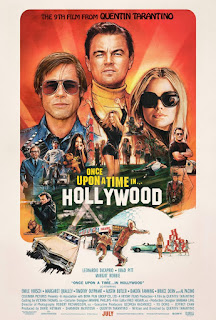"In This Town, It Can All Change, Like That..."
After a summer of truly awful summer blockbusters, with only the likes of Midsommar and reissues of Jaws, The Matrix and Apocalypse Now the very few cinematic releases to keep my sanity intact and preventing me from ending my relationship with film forevermore, thank the baby jesus for the return of Quentin Tarantino, one of the select few of talented filmmakers currently working in the world of film who is always guaranteed to expel greatness upon the big screen, with the critically acclaimed American returning to cinemas for the first time since 2016's excellent, The Hateful Eight, with the hotly anticipated and star-studded, Once Upon a Time in Hollywood. Hyped with a typically tantalising word of mouth after its' debut at this year's Cannes Festival, Hollywood sees Tarantino once again at the top of his filmmaking craft, with his so-called "ninth" picture (with the big man himself seeing both chapters of Kill Bill as a single entity) his most mature work since Jackie Brown all the way back in 1997, and whilst Hollywood by no means manages to surpass Pulp Fiction, a film which remains to this day Tarantino's undisputed magnum opus, Tarantino's latest is the closest the American has come in ages to creating a full-blown masterpiece.
As per the norm when it comes to the back catalogue of Tarantino, Hollywood sees the American have complete and utter control over a release which is seen as his most "personal" to date, a two hour, forty minute drama which essentially follows three separate plot threads for the majority of the runtime, all of which then convene for a final, and highly memorable, concluding act which for those with prior knowledge of the historical basis in which the film is based, is incredibly satisfying in its' revisionist way of distorting true events. Of the three threads, all of which set in the peace-loving, hippie ear of 1969, the primary basis of the plot follows Leonardo DiCaprio (The Revenant) and Brad Pitt (The Big Short) as Rick Dalton, a fading and emotionally crippled actor whose success on the small screen hasn't exactly paid dividends upon the big screen, and Cliff Booth, a war-hero turned stuntman with a particularly ambiguous past, two long-standing partners in the titular land of Hollywood whose careers seem to be dwindling into non-existence. Second to the primary narrative is Margot Robbie's (The Wolf of Wall Street) depiction of Sharon Tate, the beautifully angelic figure of tragedy whose involvement with the Manson Family, the subject of the film's third and final plot thread, supposedly sparked such a dramatic shift in the air of tinseltown that the landscape was changed forevermore, and with Tarantino expertly managing to mould each segment together with a surprisingly low-lew approach at times, the more you take into Hollywood in terms of knowledge about Manson and the events at Cielo Drive on that eventful night, the more you will undoubtedly take from it, particularly on an emotional level, something of which Tarantino's movies more than most tend to lack.
With such a contained yet sprawling narrative, Hollywood is clearly the closest Tarantino has come to recreating the storyline structure of Pulp Fiction since its' release in 1994, and whilst I have seen some reviews which have criticised the movie's storyline as excessive and over-indulgent, the entire point of the movie is to focus on a forgotten era in cinema of which Tarantino is absolutely fascinated with, and with a large majority of the runtime content with following our leading characters as they drive around the sunny, silky streets of a land filled with stars and dreamers, I for one was absolutely transfixed with the direction of the narrative from start to finish and bulked at how quick two hours just seemed to glide by without any issues whatsoever. Of course with such an eye-watering cast, the performances are all typically marvelous, with Pitt slightly outperforming his partner in crime and a standout cameo from Dakota Fanning (Ocean's 8) topping a wholly memorable acting collaboration, but the real winner here is of course Tarantino himself as he directs some of his best set pieces to date, particularly one staggeringly tense extended sequence in which Pitt's Booth is invited to the home of the Manson Family at Spahn's Movie Ranch. As the movie reaches its' climax, Tarantino carefully takes his time as he delicately pulls back the curtain on his perspective of events on the night of August 8th 1969, and as white-knuckle tension goes, the last twenty minutes of the movie are as gripping as anything I've ever seen, capping off what is clearly the best original movie of the year so far and a welcome return for Tarantino who provides his best work in years. Stupendous filmmaking.



No comments:
Post a Comment